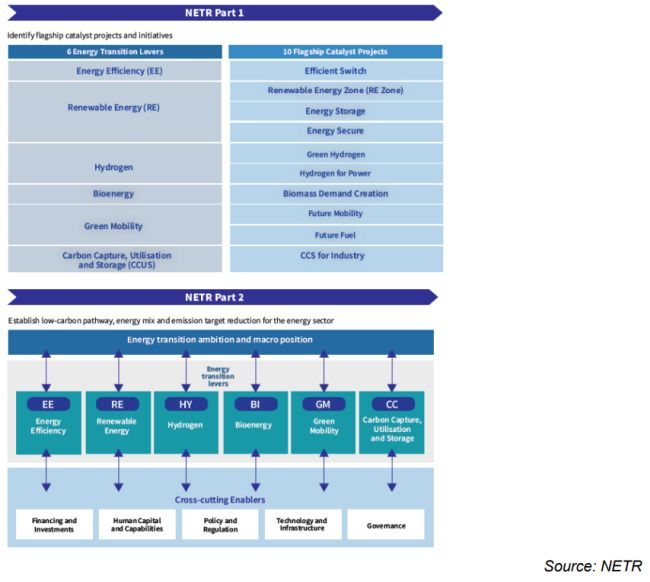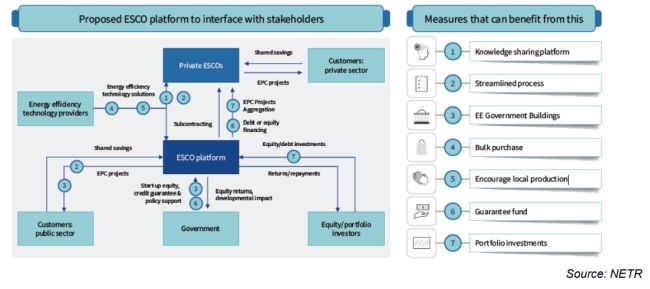Introduction
Part 1 of the National Energy Transition Roadmap ("NETR") was launched by the Ministry of Economy of Malaysia ("Ministry of Economy") on 27 July 2023, outlining ten flagship catalyst projects and initiatives based on six energy transition levers – (i) energy efficiency ("EE"); (ii) renewable energy ("RE"); (iii) hydrogen; (iv) bioenergy; (v) green mobility; and (vi) carbon capture, utilisation and storage ("CCUS"). Please click here for our write-up on Part 1 of the NETR.
Part 2 of the NETR was announced on 29 August 2023, which was essentially an introduction of the NETR in full and an introduction of, among others, the six levers and five enablers needed for the country's energy transition. This Update sets out some of the key points of Part 2 of the NETR in brief.

Review of RE policies
In developing the NETR, the following decisions have been made by the Government of Malaysia:
- to increase the country's installed RE capacity from 40% in 2035 to 70% by 2050;
- to introduce the concept of a self-contained system according to the "willing buyer, willing seller" principle to the RE development framework;
- to increase the installation of solar systems on government buildings; and
- to allow cross-border RE trade through the establishment of an electricity exchange system, complementing the ASEAN power grid initiative.
Another key takeaway from the NETR is that the Government intends to reform the power sector by establishing a third-party access ("TPA") framework to supply fuel sources, and broaden access to the grid infrastructure (possibly in the form of smart grid and/or TPA to the grid system) and the retail market.
Energy system pathway
The NETR anticipates that the country's responsible transition pathway will achieve the following by 2050:
- increased use of RE in the power generation mix;
- close to fully phased-out coal from the power generation mix;
- broad based energy efficiency initiatives pursued, particularly from the demand side management that include optimising energy consumption across key sectors, namely residential, commercial, industrial, and transport to prevent wastage and indirectly prolong the lifespan of indigenous resources; and
- shift to electrification and biofuels expedited in the transport sector.
Levers
Part 2 of the NETR saw the Government elaborate on the six levers announced during Part 1 of the NETR. Among the highlights are the proposed implementation of an energy service companies ("ESCO") platform, establishment of solar parks, development of a TPA framework and setting up of an RE exchange hub to enable cross-border RE trading, establishment of hydrogen hubs, facilitating of biomass clustering, imposition of landfill tax, quota and/or ban, and introduction of regulations and formulation of carbon pricing instruments for CCUS projects.
- Energy Efficiency
The Government views EE as the most important lever as it promotes resource optimisation and offers a cost effective and long-term solution to lower energy intensity. The NETR proposes to achieve energy savings of 22% by 2050, which is almost double the target proposed under the National Energy Policy announced a year ago. The Government intends to implement the following key initiatives to achieve the target:
- Improve EE awareness.
- Improve existing minimum energy performance standards and 5-star rating bands.
- Enforce mandatory audits for large commercial and industrial buildings.
- Establish green building codes for energy-intensive residential and commercial buildings.
- Launch a major EE retrofit initiative amongst government buildings.
- Establish an ESCO platform to coordinate public building retrofits with private ESCOs and to streamline funding and create a single financial mechanism in the form of a revolving fund through ESCO platform. The proposed structure is as follows:

Download : Malaysia's National Energy Transition Roadmap: Part 2 (Roadmap in Full)
The content of this article is intended to provide a general guide to the subject matter. Specialist advice should be sought about your specific circumstances.


